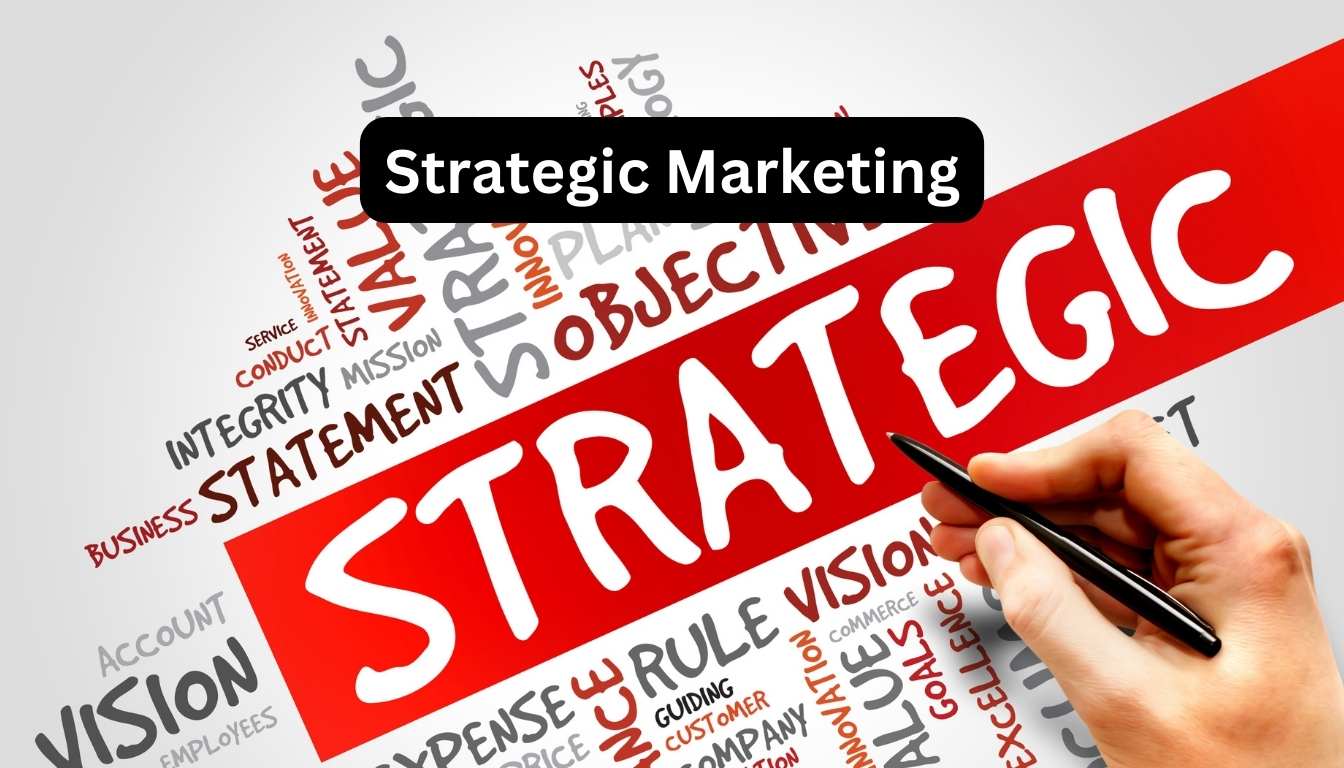Strategic marketing plays a pivotal role in the success of businesses by driving revenue and attracting customers. It involves conducting extensive research, setting clear goals, and developing effective marketing strategies to gain a competitive edge in the market. By understanding the target audience, analyzing the industry landscape, and creating a well-thought-out marketing plan, businesses can differentiate themselves from competitors and deliver superior value to customers.
Strategic marketing focuses on long-term planning and market analysis, rather than simply executing marketing tactics. It involves answering critical questions about market selection, competitive advantage, and market entry, ensuring businesses navigate the complexities of the dynamic business landscape successfully.
To better grasp the concept of strategic marketing, understanding its process, role, and benefits is essential. It empowers businesses to make informed decisions, allocate resources effectively, and achieve their goals and objectives.
Key Takeaways:
- Strategic marketing involves conducting research, setting goals, and creating effective marketing strategies.
- It focuses on differentiating businesses from competitors and providing better value to customers.
- The process includes planning, analysis, development, and implementation phases.
- Strategic marketing offers benefits like sustainable competitive advantage and increased sales.
- A marketing strategy encompasses the company’s value proposition, target demographics, and the four Ps of marketing.
The Strategic Marketing Process
The strategic marketing process consists of several key phases that businesses must navigate to develop and execute effective marketing strategies. These phases ensure that companies have a comprehensive understanding of their goals, target audience, and market dynamics. By following the strategic marketing process, businesses can create a solid foundation for success and maximize their marketing efforts.
Planning Phase
In the planning phase, businesses identify their overarching goals and objectives. This involves considering factors such as market trends, customer needs, and competitive landscape. By clearly defining their goals, businesses can establish a strategic direction for their marketing efforts. This phase provides the groundwork for the subsequent phases of the strategic marketing process.
Analysis Phase
During the analysis phase, businesses conduct market research and competitor analysis to gain valuable insights. Market research helps in understanding customer preferences, behavior, and market trends. Competitor analysis, on the other hand, enables businesses to identify their strengths, weaknesses, and unique selling propositions. These insights help businesses make informed decisions and develop effective marketing strategies.
Development Phase
The development phase focuses on creating a comprehensive marketing plan. This plan includes the four Ps of marketing: product, price, place, and promotion. Businesses determine the right products or services to offer, establish competitive pricing strategies, identify suitable distribution channels, and develop effective promotional activities to reach their target audience. This phase integrates the findings from the analysis phase to create a cohesive marketing strategy.
Implementation Phase
The implementation phase is when businesses put their marketing strategies into action. This involves executing the planned marketing activities and monitoring performance. By closely tracking key performance indicators, businesses can evaluate the effectiveness of their strategies and make necessary adjustments to optimize outcomes. This phase ensures that marketing efforts are aligned with the goals and objectives set in the planning phase.
| Phase | Description |
|---|---|
| Planning | Identifying goals and objectives |
| Analysis | Conducting market research and competitor analysis |
| Development | Creating a marketing plan based on the four Ps |
| Implementation | Executing marketing strategies and monitoring performance |
The Role of Strategic Marketing
Strategic marketing plays a critical role in differentiating a business from its competitors and providing better value to customers. Unlike traditional marketing, which focuses on executing short-term tactics, strategic marketing takes a long-term approach, emphasizing planning, market analysis, and creating a unique selling proposition.
One of the key aspects of strategic marketing is market selection. Businesses must carefully choose the markets in which they want to compete and identify the target audience they aim to serve. By understanding the needs and preferences of their target customers, businesses can tailor their marketing efforts to meet their specific demands.
Another important factor is competitive advantage. Strategic marketing involves assessing the strengths and weaknesses of competitors and finding ways to differentiate the business. This could be through product innovation, superior customer service, or effective branding strategies that set the company apart.
Market entry is also a crucial aspect of strategic marketing. Businesses need to determine the most effective ways to enter new markets or expand their presence in existing ones. This could involve selecting the right distribution channels, establishing partnerships, or leveraging digital marketing strategies to reach a wider audience.
Overall, the role of strategic marketing is to provide businesses with a comprehensive framework for achieving their goals and objectives. It ensures that marketing efforts are aligned with the overall business strategy and focuses on creating long-term value for both the company and its customers.
Benefits of Strategic Marketing
Strategic marketing plays a crucial role in the success and growth of businesses. By implementing effective strategic marketing techniques, businesses can reap several benefits that contribute to their overall success.
1. Achieving a Sustainable Competitive Advantage
One of the key benefits of strategic marketing is that it helps businesses establish a sustainable competitive advantage over their competitors. By understanding consumer needs and wants, businesses can develop unique value propositions that differentiate them in the market. This allows them to attract and retain customers, even in the face of competitive pressures.
2. Effective Allocation of Advertising Dollars
Strategic marketing enables businesses to allocate their advertising dollars more effectively. By conducting thorough market research and analysis, businesses can identify the most effective marketing channels and tactics to reach their target audience. This ensures that resources are utilized efficiently, maximizing the impact of their marketing efforts.
3. Measuring the Success of Marketing Efforts
Another advantage of strategic marketing is the ability to measure the success of marketing efforts. By defining clear objectives and implementing specific metrics, businesses can track the performance of their marketing campaigns and make data-driven decisions. This allows them to identify what works and what doesn’t, making necessary adjustments to optimize their marketing strategies.
4. Increased Sales and Bottom-line Growth
A well-executed strategic marketing approach can lead to increased sales and bottom-line growth. By understanding their target audience and creating compelling marketing messages, businesses can attract more customers and drive revenue. This growth in sales and revenue ultimately contributes to the overall success and profitability of the business.
Overall, the impact of strategic marketing on businesses is immense. It helps them differentiate themselves from competitors, allocate resources effectively, measure the success of their marketing efforts, and achieve sustainable growth and success.
Key Components of a Marketing Strategy
A marketing strategy is a crucial element in achieving business goals and effectively reaching the target audience. It involves a comprehensive plan that outlines the company’s value proposition, target customer demographics, and the integration of the four Ps of marketing:
- Product: This component involves defining the features, design, and benefits of the product or service to meet the needs and wants of the target market.
- Price: Determining the price of the product or service requires considering factors such as cost, competition, and perceived value to ensure profitability and competitiveness.
- Place: The place component focuses on selecting distribution channels that provide easy access for customers to purchase the product or service.
- Promotion: Promotion entails creating and implementing marketing communications strategies to inform, persuade, and influence potential customers about the product or service through various channels.
These components work together to create an overall game plan for attracting and converting prospective customers into loyal consumers. A well-defined marketing strategy provides a framework for decision-making, guides resource allocation, and ensures consistency in brand messaging and customer experience.
The Four Ps of Marketing in Action:
Let’s dive deeper into how each of the four Ps of marketing can influence a marketing strategy:
| Component | Example |
|---|---|
| Product | Apple’s iPhone series with innovative features and sleek design. |
| Price | Starbucks’ premium pricing strategy for their specialty coffee beverages. |
| Place | Amazon’s global online marketplace providing convenient access to a wide range of products. |
| Promotion | Coca-Cola’s creative advertising campaigns that evoke emotions and drive brand loyalty. |
By focusing on these key components, businesses can develop an effective marketing strategy that aligns with their overall business objectives, resonates with their target audience, and drives sustainable growth.
Creating a Marketing Strategy
When it comes to achieving business goals and objectives, creating a marketing strategy is crucial. This strategic approach enables businesses to effectively reach their target audience and communicate the unique value of their products or services. A well-defined marketing strategy lays the foundation for successful marketing campaigns and ensures that resources are allocated efficiently. To create an impactful marketing strategy, there are several key steps to follow:
- Identify Goals: Begin by setting clear and specific goals for your marketing strategy. Whether it’s increasing brand awareness, driving sales, or expanding into new markets, clearly defining your objectives will guide the rest of your strategy.
- Know Your Target Audience: Understanding your target audience is essential for delivering the right message to the right people. Conduct market research, analyze consumer behavior, and segment your audience to tailor your marketing efforts effectively.
- Create a Compelling Message: Craft a message that communicates the unique value of your products or services. Your message should resonate with your target audience and differentiate your brand from competitors. Focus on addressing their pain points and providing solutions.
- Define the Budget: Determine the budget for your marketing activities. This will help you allocate resources effectively and prioritize your marketing initiatives. Consider factors such as advertising costs, content creation, and marketing tools or technologies.
- Determine the Marketing Channels: Decide on the marketing channels that best reach your target audience. Whether it’s social media, email marketing, content marketing, or traditional advertising, select the channels that align with your goals and allow you to engage with your audience effectively.
- Measure Success Through Metrics: Establish key performance indicators (KPIs) and metrics to track the success of your marketing strategy. This could include metrics like website traffic, conversion rates, customer engagement, or ROI. Regularly review and analyze these metrics to refine your strategy.
By following these steps, businesses can develop a comprehensive marketing strategy that aligns with their objectives and drives results. It’s important to remember that creating a marketing strategy is an iterative process that requires ongoing monitoring and adjustment. Adapt your strategy as market trends and customer preferences evolve to ensure continued success.
Business-to-Business Strategic Marketing
Business-to-Business (B2B) strategic marketing is a specialized approach that focuses on effectively differentiating a business from its competitors within the target market. It goes beyond traditional marketing tactics, requiring a deep understanding of the firm’s capabilities, the customer market, and the competitive landscape. B2B strategic marketing plays a crucial role in answering key questions related to market selection, competitive advantage, and market entry.
In B2B strategic marketing, businesses aim to position themselves as the preferred choice for other businesses within their industry. This involves creating a unique value proposition that resonates with the target audience’s needs and challenges. By developing tailored marketing strategies, businesses can effectively communicate their offerings and differentiate themselves from competitors.
One of the major differences between B2B and B2C (Business-to-Consumer) marketing is the target audience. B2B marketing focuses on appealing to other businesses and decision-makers who are driven by factors such as cost savings, efficiency, and long-term partnerships. On the other hand, B2C marketing targets individual consumers who are influenced by emotions, personal preferences, and immediate gratification.
To better understand the distinction between B2B and B2C marketing, refer to the following table:
| B2B Marketing | B2C Marketing |
|---|---|
| Targets other businesses as customers | Targets individual consumers as customers |
| Focuses on long-term relationships and partnerships | Focuses on short-term transactions |
| Emphasizes rational decision-making | Appeals to emotions and personal preferences |
| Value proposition is based on business needs and efficiency | Value proposition is based on emotions and personal desires |
B2B strategic marketing requires a comprehensive understanding of the target market, including industry trends, buyer behavior, and pain points. By conducting thorough market research and analysis, businesses can identify opportunities and position themselves as the go-to solution provider for their target audience. This involves crafting a compelling marketing message, leveraging appropriate marketing channels, and delivering value that aligns with the needs and objectives of other businesses.
In the next section, we will explore the importance of a marketing strategy and the benefits it brings to businesses.
The Importance of a Marketing Strategy
A well-defined marketing strategy is essential for businesses to succeed in today’s competitive landscape. It serves as a roadmap to effectively allocate resources, establish brand positioning, reach target audiences, and communicate the value proposition of products or services.
One of the key benefits of having a marketing strategy is achieving a sustainable competitive advantage over competitors. By conducting thorough market research and analysis, businesses can identify unique opportunities and develop strategies to capitalize on them. This enables businesses to differentiate themselves from competitors, attract more customers, and ultimately drive revenue.
Furthermore, a well-crafted marketing strategy allows businesses to measure the effectiveness of their marketing efforts. By defining specific objectives, implementing tracking mechanisms, and analyzing key performance indicators, businesses can gain valuable insights into which marketing tactics are working and which ones need adjustment. This data-driven approach helps businesses optimize their marketing activities and achieve better results.
A marketing strategy also ensures that businesses remain focused, strategic, and aligned with their goals and objectives. It provides a framework for making informed decisions about product development, pricing strategies, distribution channels, and promotional activities. This strategic approach minimizes wasted resources and maximizes the return on investment.
Finally, a well-executed marketing strategy can lead to increased brand awareness, customer loyalty, and business growth. By consistently delivering targeted messages to the right audience, businesses can build brand reputation, establish credibility, and foster long-term relationships with customers. This not only increases customer retention but also attracts new customers through positive word-of-mouth and referrals.
To summarize, the importance of a marketing strategy cannot be overstated. It empowers businesses to effectively allocate resources, differentiate themselves from competitors, measure marketing efforts, and achieve their goals and objectives. A thoughtfully crafted marketing strategy sets the foundation for sustainable business growth and ensures that businesses remain agile in an ever-evolving marketplace.
Conclusion
Strategic marketing is an essential approach for businesses seeking successful growth. By employing careful planning, analysis, and execution of marketing strategies, businesses can effectively differentiate themselves from competitors. Understanding the market, identifying the target audience, and creating a unique value proposition are crucial concepts within strategic marketing. These concepts allow businesses to attract customers and drive revenue. Additionally, strategic marketing is an ongoing process that enables businesses to adapt to market changes and achieve their goals and objectives.
In summary, a strategic marketing approach involves utilizing strategic marketing concepts to create a competitive advantage in the market. By implementing a well-thought-out marketing plan and consistently evaluating and adjusting marketing strategies, businesses can position themselves for long-term success. Strategic marketing helps businesses stand out from the crowd, understand their customers, and deliver value that sets them apart. Embracing strategic marketing is a proactive way for businesses to navigate the ever-evolving landscape and achieve sustainable growth.





